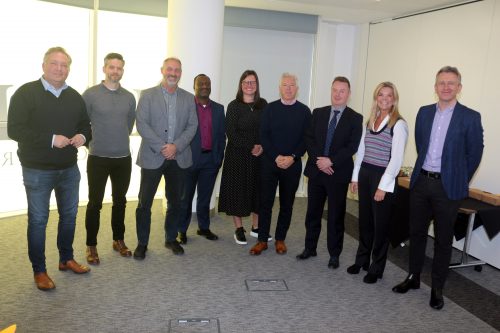The challenges facing fast-growth companies

Growth is the key sign of a healthy business, but superfast growth carries challenges.
From core strategy to operations, superfast growth is disruptive. Can you build sustainably on an exceptional growth period, or will you expand too quickly too soon? Can you hold on to your key values and culture? Can you hire new people of the right attitude and calibre?
TheBusinessDesk.com, in association with Blacks solicitors and Fresh Thinking Group, brought together leaders from several of Yorkshire’s fastest-growing companies to discuss the challenges and opportunities by extreme growth.
Several of the leaders found the human element the most challenging part of sustaining growth.
Richard Morton, banking partner at Blacks, said he found greatest challenge was making sure his team was the right size. “You never know when you’ve just got a blip. You can never turn work away – or at least, you can only do it once. For us its about maximising utilisation, but making sure that we have all the people we need to deliver what you expect on time and on budget.”
Gill Marchbank, chief executive of ResQ, which provides multichannel customer service and sales support, said that she had noticed high attrition in since the Covid pandemic. “People make us money, so the longer they are with us, the more money they make us. Keeping them is a challenge.”
Andy Crossley, tech director at business consultancy The Oakland Group, said staffing was something of a pendulum. “There’s resourcing, getting people fast enough and slowing down. We often flip-flop between ‘we’ve got too many people’ and ‘we haven’t got enough’. We’re probably at the point now where we’re getting to very high utilization and we need to invest and create some capacity.
“But when we’re growing, our MD is always saying, ‘I don’t worry about growing, I worry about what we’re growing into. Holding that culture, that’s what we built our DNA around. How do you hyold that when it was 123 people and now it’s 100?
“Related to that is the leadership. You need to cascade the leadership beyond the four directors that actually make it work, because we often get dragged into doing, rather than running the business.”
Oliver Reece, managing director of consultancy and funder Fresh Thinking Group, agreed. “I feel the points around retaining the culture of the business as you grow is very, very difficult,” he said. “It gets quite a challenge for a business like ours, with people that actually make the business. How do you grow the business and the brand awareness? What you want and have is a collection of very individual people – you want people with personality and their own skill set – but how do you avoid just becoming those 4, 5, 6, 7 people? How does the business survive as it grows?”
Simon Causier, commercial director of plant hire and sales firm Warwick Ward, also found talent a major challenge.
“Our business has been going for 52 years and growth has been tremendous over the last 16 years,” he said. “We were a £7m turnover firm with 30-35 people and one depot based in Barnsley. Today we are £60m, 110 people, four depots. Moving from a small family business to a medium business that deals with more corporate clients, the challenge has been mainly to backfill the infrastructure, recruiting people to deal with the type of new business we now have, and retaining those people.”
Talent was not the only challenge on faced by fast-growing firms.
Causier added, “There are the systems and procedures you need to operate in that [new] marklet as well. Where before we were a small business dealing with used equipment, our shift in the business means getting the right people and putting the procedures in the infrastructure to maintain the business. There have been some bumps in the road, but we’ve got there.”
Gill Marchbank of ResQ also identified cash management to support growth as a key challenge. “Cash management and invoice discounting facilities have been a challenge. Traditional banks don’t really understand what we do. We don’t sell widgets – people are our business. That’s difficult.”
Adrian Barraclough, owner and chief executive of Audasi Group, which has several manufacturing and property companies, which said physical limitations of buildings were a challenge in his manufacturing firms. “You’ve got to take on a new building on a 10-year contract. I’ve had to hold our business at £35m. If we could supply £100m, we’re able to get enough work for it. But I’m not prepared to commit to new factories, new sites, new anything else.
“When I think we need a superfactory, no one’s interested. There’s no real support from government or councils or anybody. It’s just down to us.”
Switalski’s Solicitors has grown over 22 years from £1m turnover to £13m though a combination of organic growth and targeted acquisitions. While acknowledging Managing director John Durkan said funding growth had been a major issue.
“There’s always issues around funding – matching the funding to your ambitions for how you want to develop the business. There’s also growing the business side – have we found space? We’ve always got to be sure we’ve got the infrastructure in place, where that’s people, IT, et cetera.
“When we were making our step change in terms of size I knew I needed to bring in other management people. I was mainly the management person, but I wanted to bolster the internal core of management. We managed to do that, which then facilitated further growth.
“But funding is the big challenge. In some of our areas of work we can be five or six years and not a penny until after payout. And then you might lose a case and get nothing. You’ve got to be very careful around case selection.”
This first of two articles from the Fast Growth round table considered some of the challenges of rapid business growth. In part two we look at some of the solutions leaders have developed to manage growth, and West Yorkshire Combined Authority’s director of inclusive economy, skills and culture, Felix Kumi-Ampofo, reveals how authorities can help.








